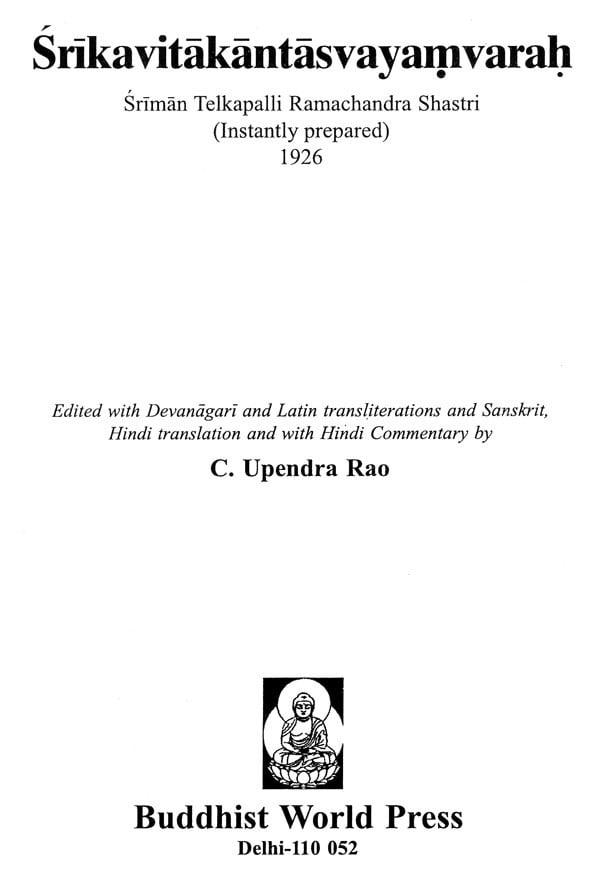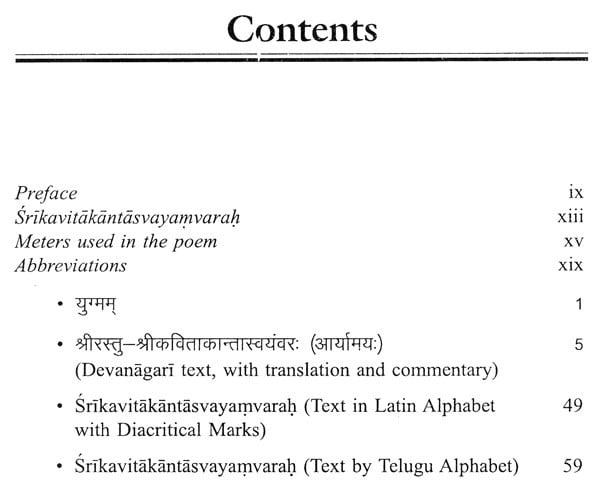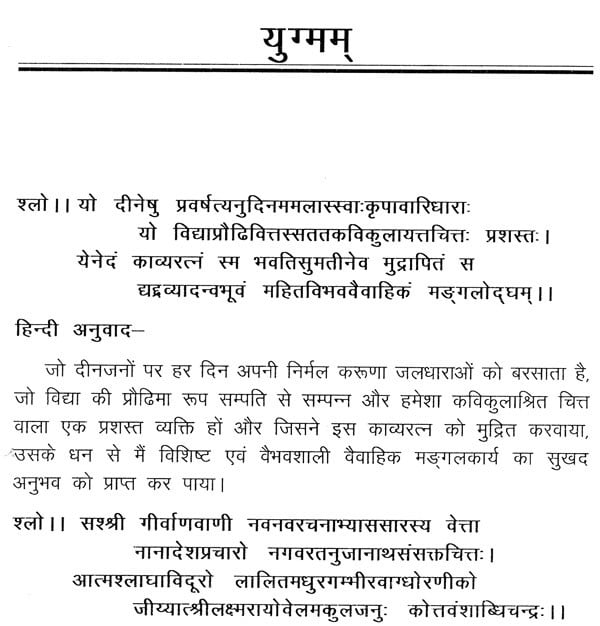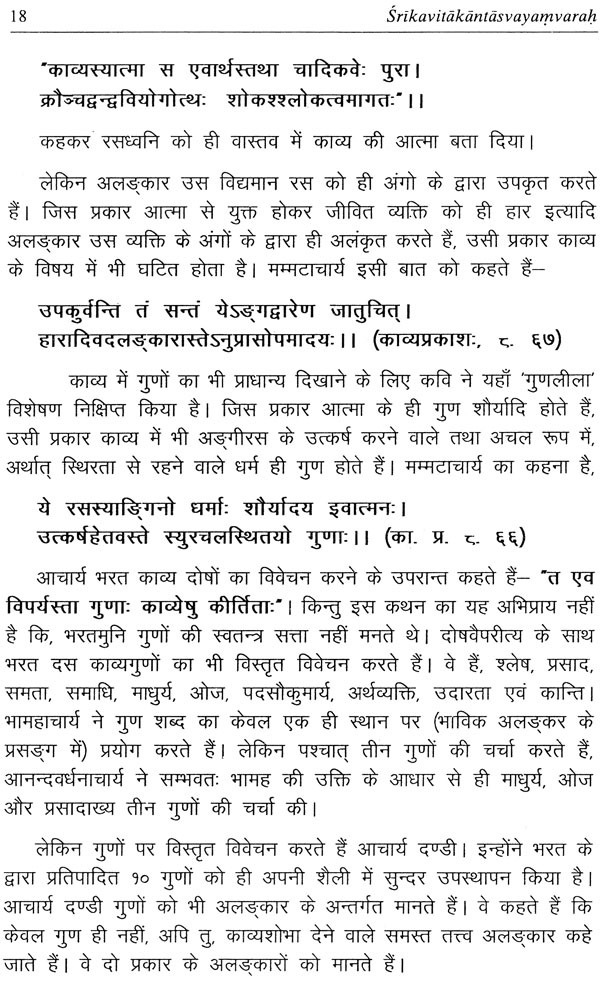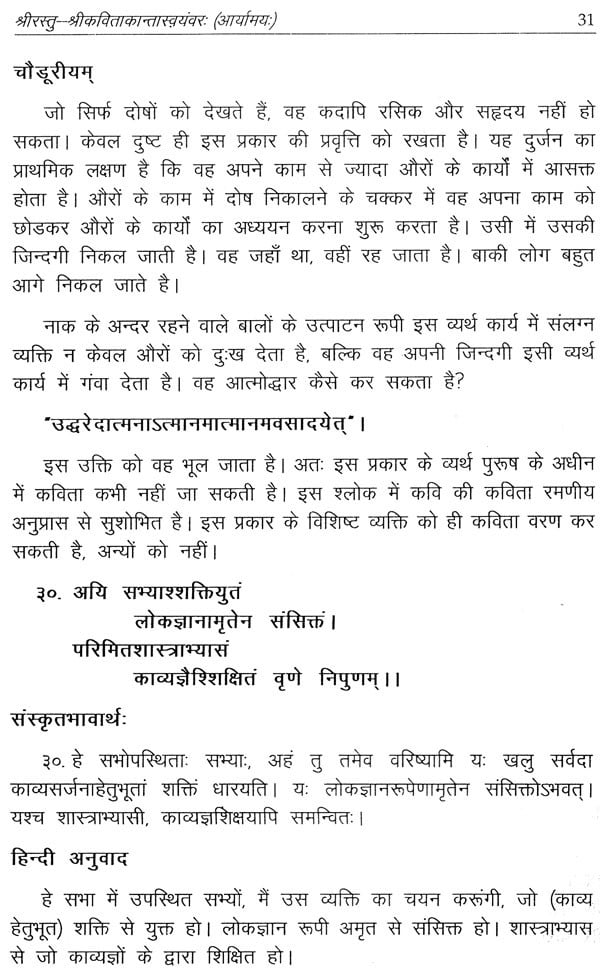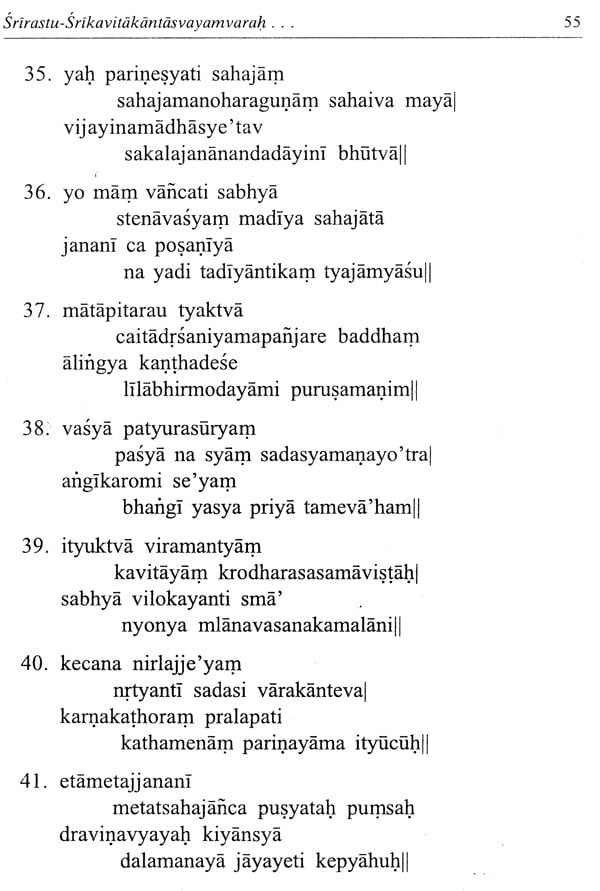
Srikavitakantasvayamvarah- Sriman Telkapalli Ramachandra Shastri (Instantly Prepared 1926)
Book Specification
| Item Code: | UAW566 |
| Author: | C. Upendra Rao |
| Publisher: | Buddhist World Press |
| Language: | Sanskrit Hindi and Telugu |
| Edition: | 2023 |
| ISBN: | 9789391985066 |
| Pages: | 95 |
| Cover: | HARDCOVER |
| Other Details | 10.00 X 6.50 inch |
| Weight | 320 gm |
Book Description
"Srikavitakantasvayamvarah" was instantly composed (Asukavya) by Sriman Telkapalli Ramachandra Shastri, during the 19th century A.D. In Telangana. This poem is very interesting for deserving readers, mainly for the accomplished scholars of Kavyasastra. The Sanskrit manuscript was transliterated into Devanagari and Latin diacritics and also translated it into Sanskrit and Hindi with a Hindi commentary. 'Coudüriyam. Prof. C. Upendra Rao, a renowned academician from JNU, New Delhi.
Goddess Saraswatt, the mother of the whole world once gave birth to two brilliant and marvellous daughters. Brahma with great happiness had invited all Gods for their naming ceremony. All Gods reached the abode of Brahma and there was a great auspicious occasion of celebration. Brihaspati, the teacher of Gods has prepared the birth horoscope of those two daughters and the mother Parvati named the first daughter 'Kavita' and the Goddess Laksmi named the second daughter 'Giti God Brahma arranged her "swayamvara", in which there was a large number of scholars, Gods, and other deserving princes, looking at them, the Kavita said, Valyakarana, is like my father, a logician is equal to my brother. The Vedic scholar too is equal to my brother. But the Mimamsa is like my enemy. Therefore none of them can be my custodians.
Later she placed the fragrant garlands around the neck of God Sri Krsna. Kavita married him when all Gods extended their blessings. In course of time a delightful daughter was born to them, who was named 'Kirthi'. Then the poem ends with the boundless admiration of divine qualities of Sri Krsna.
Prof. Dr. C. Upendra Rao is a prominent scholar in Pall, Sanskrit, and Indic Studies. He is the Senior Professor in the School of Sanskrit and Indic Studies at Jawaharlal Nehru University. New Delhi, and teaches Pall and Sanskrit. As a Chairperson of Special Centre for Sanskrit Studies at J N U., Prof. Rao has served the university in various ways and was appointed as a Visiting professor on ICCR Chair of Buddhist Studies, Govt. of India in Cambodia. He has extensively written and published research papers and books in Sanskrit, Pall, Hindi, Telugu, and English and authored 25 books on Indic Studies, including the Pall, and received awards and certificates of honors from various institutions in India and abroad.
He was a visiting professor in the Latvia University, Riga, Latvia, Europe; National University of Kyiv Mohyla Academy, Kyiv, Ukraine: L N. Gumilyov Eurasian National University, Astana, Kazakhstan; Preah Sihanouk Raja Buddhist University, Phnom Penh, Cambodia: Department of History. Belarus State University, Minsk. Belarus: Hue Quang Buddhist Monastery, Hochiminh city, Vietnam, South East Asia. He delivered lectures and Presented several papers at international conferences held in Foreign Countries, and was associated with the translation project from the Khyentse Foundation as part of the 'Buddhist Literary Heritage Project' (BLHP) to translate the "Arya Pita Putra Samvadasutra." He is serving various educational institutions as a member of their academic bodies.
I am delighted to present a beautiful, old Sanskrit poem Śrī Kavitäkäntä-Swayamvarah, to the lovers of Sanskrit poetry. This poem was authored by Śrīmän Telkapalli Ramachandra Shastri (T.R.S.), a gifted poet of Sanskrit during the 19th century A. D. from Telangana region. I found this small but extremely delightful poem from the old collections of my father, late Sri Chowduri Gopala Rao, who himself was an eminent scholar, prolific writer, and a poet in the Telugu language.
In my childhood, I was inspired by his precious collection of books and was constantly searching for something valuable from it. When I found two very old, dilapidated, and small paper manuscripts of T. R. S.in old Telugu script, I was thrilled initially, by their appearance. Later with the permission of my father, who has placed them in my hands, saying, "read and try to understand these poems, as they are excellent compositions, authored by a talented Sanskrit poet T.R.S, of our district".
**Contents and Sample Pages**
